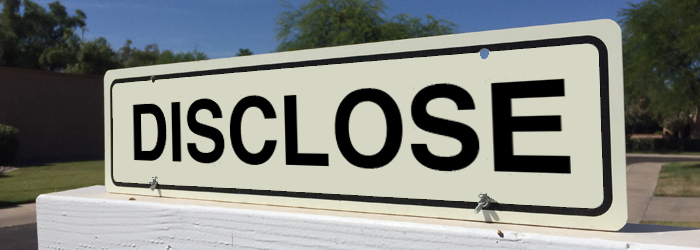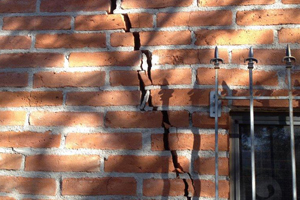Selling your house? Secrets are a No-Go.
 19 July 2016
19 July 2016 

If you’re selling your house, you have to be really honest with potential buyers. That old warning, “Let the buyer beware,” should probably read, “Let the seller beware.”
 “The largest number of lawsuits filed against sellers who have sold their houses involve lack of disclosure,” says Martha Appel, vice president and Designated Broker of Coldwell Banker Residential Brokerage in Arizona.
“The largest number of lawsuits filed against sellers who have sold their houses involve lack of disclosure,” says Martha Appel, vice president and Designated Broker of Coldwell Banker Residential Brokerage in Arizona.
As a seller, you might feel uncomfortable about bringing up issues that could slow or stop the sale of your home, but most buyers will find out anyway, particularly if they have a home inspection while in escrow. If you are puzzled about an issue, bring it up with your Realtor who can tell you what the law requires in Arizona but will also urge you to put all the negative stuff out in the open.
One of the biggest problems with Arizona homes, Appel says, is that a seller has done unpermitted work on a house – like turning a garage into a bedroom or enclosing a covered patio to make it a family room. If he or she doesn’t disclose this to a buyer, and the house sells, trouble can come up later; for example, if the new owner decides to remodel the garage/bedroom. But when the new owner goes to the city for a permit to renovate, they find out that no original permit was ever taken out, and the whole issue explodes into a bigger problem.
Sometimes sellers may think all they have to say is that the house is for sale “as is,” and that general statement will cover all sins. But that’s no legal protection at all. Sellers must still disclose any known defects about the house.
After 19 years with Coldwell Banker, Appel has seen about 50 lawsuits take place -- 90 percent of them involving issues buyers claim were not disclosed before they bought the house.
Here is a list of some of disclosures buyers should make:
1 – Water leaks caused by plumbing or roofing. Even if the damage was repaired, you still need to disclose where and when the leak occurred and what was done. That’s because there could be a secondary mold problem that is still festering and growing behind the roof or walls.
2— Electrical or air conditioning problems, even if you fixed them.
3 – Any fires in the house, plus repairs or fixes done.
4 -- If there’s a noisy factory or a public airport nearby, buyers need to know, even if it should be really obvious when they visit the house. If you are in the vicinity of a military air base, state law requires you disclose it.
5 – Structural problems, like cracks in the floor, and settling or foundation issues. Even if the problem was fixed, disclose it. State law even says you must disclose fissures on your property.
6 – Radon intrusion in your home. Even if you fixed it, disclose it.
7 – If animals have lived in the house – cats, dogs or whatever – disclose it. Buyers often find out when they have the carpet cleaned.
8 – If you’ve had roof rats or desert pack rats, disclose it.
9 – If you’ve had scorpions, reptiles, rabid animals or bed bugs in the house or yard, disclose it.
10 – Termites and termite work? Disclose it.
11 – If your homeowners’ association is very sticky about the rules, disclose it.
12 -- If your home was built before 1978, it may have lead paint in it. If you have tested your house and know you have lead paint, it must be disclosed.
If you or anyone else has ever suspected that there have been ghosts visiting your house, you should disclose that too, Appel says.
 There are some problems that state law says you do not have to disclose. They include whether a natural death, murder, suicide, or major felony occurred in your house. Nor do you have to disclose if someone with HIV infection or AIDs has lived in the house. Nor do you have to let anyone know if a sex offender lives in the neighborhood. But if someone asks about one of these situations, don’t lie.
There are some problems that state law says you do not have to disclose. They include whether a natural death, murder, suicide, or major felony occurred in your house. Nor do you have to disclose if someone with HIV infection or AIDs has lived in the house. Nor do you have to let anyone know if a sex offender lives in the neighborhood. But if someone asks about one of these situations, don’t lie.
The moral of this story probably is: When in doubt, spit it out (in writing).
###
Photo Credits:
- Header image: Rosie on the House
- Pack rat: Mr. Pack Rat
- Wall crack: Arizona Foundation Solutions
- Electrical Panel: Rosie on the House
- Termite Tube: Rosie on the House
RELATED CONTENT:
- BLOG: Catch a buyer's eye with these DIY projects
- DIY Q&A: Considering a flipped home? Look out for these items...
- DIY Q&A: DIY Projects that Require a Permit
- Find a quality contractor: Rosie on the House Home Improvement Referral Network
- Search our DIY Home Improvement Database & Library
- Weekly Podcast: Subscribe for free!
Print this page
recent post
- Duck, Duck, Duct! How Often Should Ductwork Be Cleaned?
- Vinyl vs. Fiberglass Windows: Which Is The Better Choice Of Replacement Window?
- We May Be The Grand Canyon State, But The Rocky Mountains Are Important For Arizona
- Welcome to Arizona! Things A Newbie to Arizona Should Know
- The Pros & Cons of Buying A Flipped House
- Getting In On The Ground Floor
- Why It’s More Critical Than Ever To Get Your AC Serviced Before Summer
- The Reality of Remodeling
- What To Look For When Comparing Your Roofing Quotes
- What To Expect When Buying New Windows & Doors
